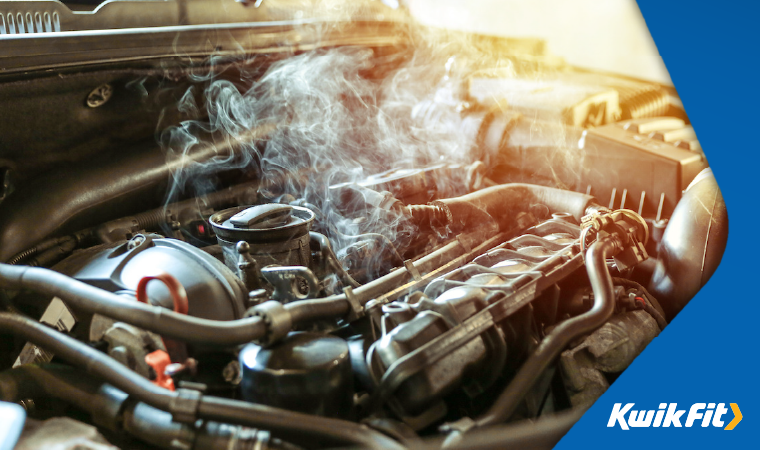Car Radiator Fan Not Working? Here's Why
Jack Dreyer | Friday 9th February 2024 12:45pm

To some drivers, the technicalities of their car remain a mystery, and they prefer it that way. However, others are keen to understand the functionality - including the importance of their radiator fan.
Your car's radiator fan plays a crucial role in preventing overheating and maintaining engine efficiency. However, when it stops working, it can be a significant cause for concern. In this blog, we explore the reasons behind car radiator fan issues, and practical insights into diagnosing and fixing the issue. Explore the intricacies of your car's cooling system to keep it running smoothly on the road ahead.
Can a car run without a radiator fan?
Although in short, yes, you can technically drive your car without a radiator fan, it is not recommended that you do. Each time your engine overheats, due to an issue with your radiator fan, damage is done to your vehicle's cooling system, which is vital to its performance.
Therefore, if your car's radiator fan is not working, it's essential to work out exactly what has caused the issue, and ensure you address that promptly, to prevent overheating and potential engine damage.

Common causes of a faulty radiator fan
A faulty radiator fan can stem from various underlying issues, each affecting its performance and reliability. Understanding these common causes of radiator fan failure helps car owners to identify and address problems, ensuring optimal engine cooling and preventing costly repairs later down the line.
Common causes of a faulty radiator fan include:
Electrical issues
One of the main causes of radiator fan issues are electrical issues, such as a blown fuse, a faulty relay, or wiring issues. These can cause the radiator fan to malfunction. If the fan's electrical components fail, it won't receive power to operate properly.
Mechanical failures
Similarly, mechanical issues can also occur. These are likely a faulty fan motor or broken fan blades, which can both prevent the radiator fan from working correctly. Over time, the motor may wear out or become damaged, leading to a loss of functionality.
Car radiator leak
Low coolant levels and leaks can also affect the performance of the radiator fan by reducing overall coolant levels in the system. Low coolant levels can lead to overheating, which may result in the radiator fan working harder than usual or failing altogether.
Temperature sensor malfunction
Modern vehicles are equipped with temperature sensors that monitor engine temperature and control the operation of the radiator fan. A malfunctioning temperature sensor can cause the fan to operate erratically, or not at all, both of which lead to cooling problems.

Maintenance tips to keep your car radiator fan in good condition
Maintaining your car's radiator fan ensures efficient engine cooling and prevents costly repairs. A properly functioning radiator fan helps regulate engine temperature, playing a vital factor in reducing the risk of your vehicle from experiencing overheating issues. Although there are a number of reasons why your radiator fan might not work properly, here are a few maintenance tips you can follow from home to help reduce the chance of issues.
Regular maintenance checks
The first and easiest way to keep on top of your car radiator fan condition is to regularly inspect the radiator fan, blades, and surrounding components for any signs of damage, wear, or obstruction. Make sure to remove any debris or foreign objects that may be blocking the fan's airflow.
Clean the radiator and fan blades
Make sure you regularly clean the radiator and fan blades to remove dirt, dust, and debris buildup. You can use a soft brush or compressed air to gently clean the radiator fins and fan blades at home. Clean radiators and fans promote better airflow and cooling efficiency, so be sure to check and clean these before you choose your next steps.
Check coolant levels & leaks
It is key that you regularly check the coolant levels in your car's cooling system. As we have already discovered in this blog, low coolant levels can affect the effectiveness of the radiator fan in dissipating heat. Make sure to top up the coolant as needed and address any leaks promptly.
Monitor the temperature gauge
Modern vehicles make it easy for you to ensure you can easily check the temperature of the engine. If your engine is hotter than usual, it's vital you pull over and let the engine cool. If it persists, you will need to visit a garage and let them check your vehicle.
Seek professional help with Kwik Fit
If you have ongoing issues with your car radiator, we strongly recommend bringing your vehicle into your local Kwik Fit centre or simply book in for a free vehicle safety check.
Interested in learning more about your vehicle and its intricacies? Keep up with the Kwik Fit blog, or youíve got any specific questions, get in touch with us today.
Any facts, figures and prices shown in our blog articles are correct at time of publication.
Featured Articles
Is it Illegal to Drive With One Headlight?
Saturday 19th July 2025
Wondering if itís illegal to drive with one headlight? Learn about the safety risks and penalties of illegal blown bulbs and why you should fix them promptly.
Air Con in EVs & Hybrids: Experts Answer Your Questions
Monday 30th June 2025
Does air con drain EV batteries? Can you use the air con while charging an electric car? Find out the answers to these questions & more from Kwik Fitís experts.
Why Is Your Car Making a Noise? Fixes & Tips
Friday 13th June 2025
When your car starts making unexpected noises, it can certainly be quite disconcerting; it may be nothing to worry about, but hereís what you need to know.









